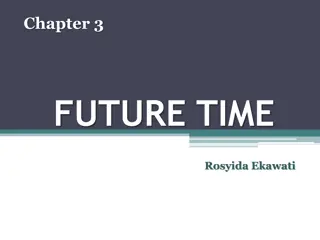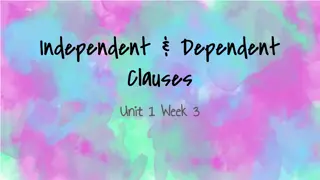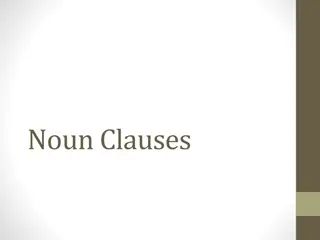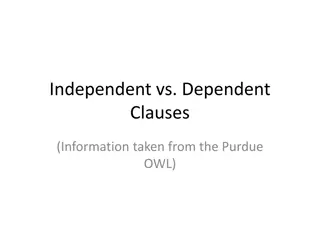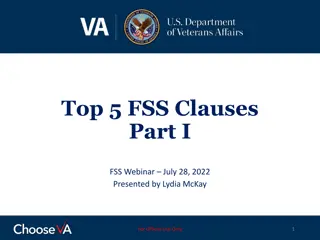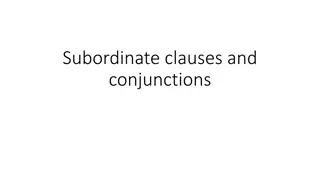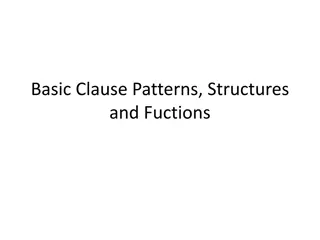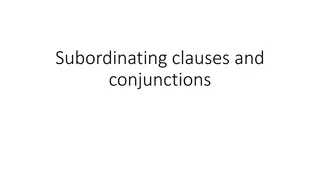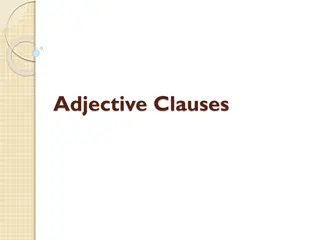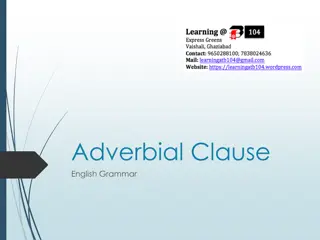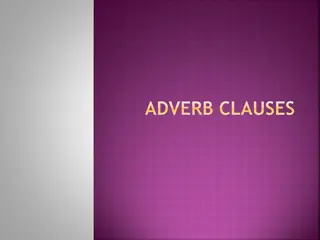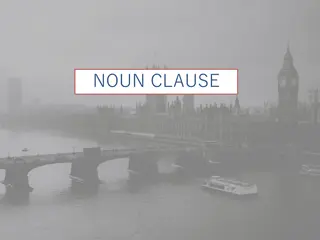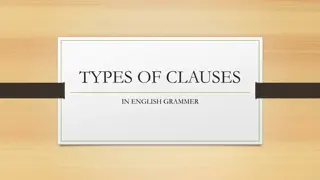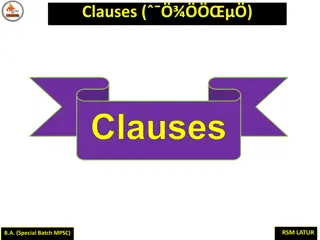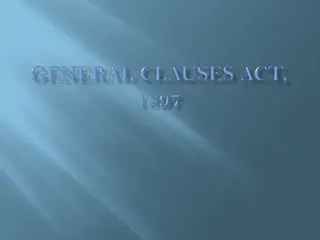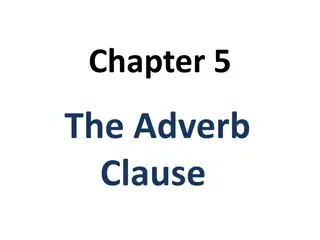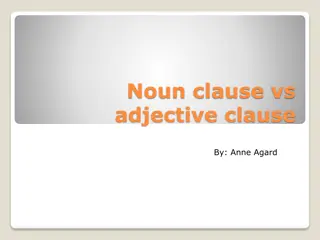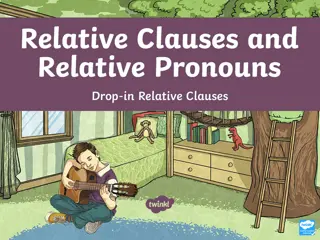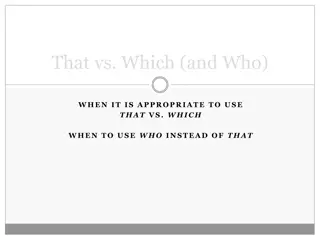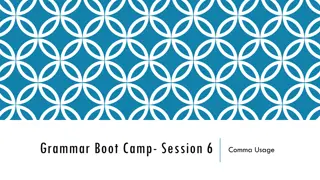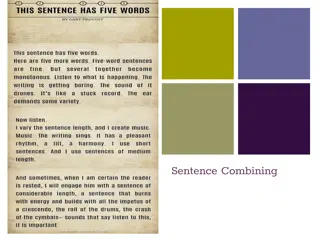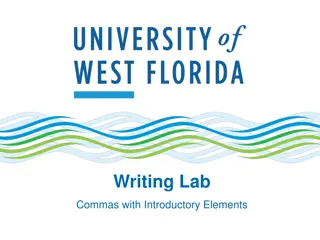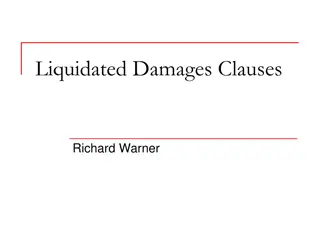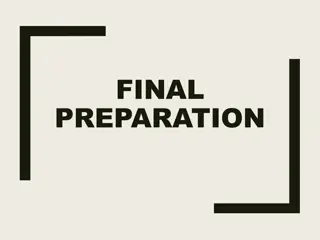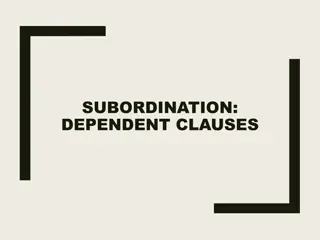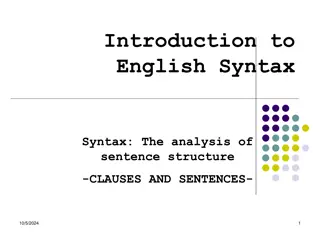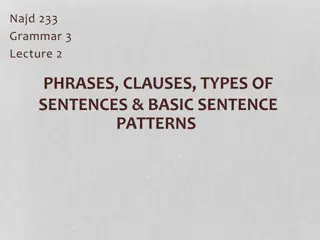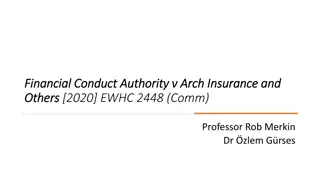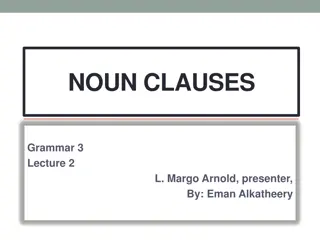The Seven Military Clauses
Explore the various military clauses and congressional powers outlined in the US Constitution, including the authority to raise armies, maintain a navy, regulate land and naval forces, call forth the militia, and more. The comparison between professional armies/navies and militia, as well as the res
1 views • 19 slides
Understanding Introductory Phrases and Clauses in Grammar
Learn how to properly use introductory words and clauses in sentences by understanding when to add commas before independent clauses. Explore examples and practice sentences from the song "Happy" by Pharrell Williams. Enhance your grammar skills and create well-structured sentences with this informa
1 views • 115 slides
Understanding Embedded Clauses in Writing
Explore the use of embedded clauses in writing through examples and practice exercises. Learn to identify main and subordinate clauses, conjunctions, and create sentences with fronted adverbials. Enhance your writing skills by understanding the structure and function of embedded clauses.
0 views • 12 slides
Understanding Phrases, Clauses, and Expressing Future in Time Clauses
Learn about the difference between phrases and clauses in sentences. Understand how clauses can be independent or dependent, and how time clauses are used to express future actions. Discover the rules around constructing time clauses and their significance in sentence structure.
5 views • 14 slides
Understanding Independent and Dependent Clauses
An independent clause contains a subject and a verb, forming a complete sentence on its own, while a dependent clause also has a subject and a verb but cannot stand alone. Dependent clauses rely on independent clauses to form complete sentences and are introduced by subordinating conjunctions. When
0 views • 4 slides
Understanding Noun Clauses in English Grammar
A clause is a group of words with a subject and a verb, while a phrase lacks one. Independent clauses can stand alone, while dependent clauses cannot. Noun clauses function as nouns in a sentence, serving different roles like subjects, objects, prepositional objects, and complements. They can start
1 views • 49 slides
Understanding Independent vs. Dependent Clauses
Independent clauses express complete thoughts and can stand alone as sentences, while dependent clauses require an independent clause for support. Learn about coordinating conjunctions, comma splices, and run-on sentences to enhance your understanding of sentence structure. Avoid common errors by re
1 views • 10 slides
Understanding Top 5 FSS Clauses for Federal Supply Schedule Contracts
This training session delves into the crucial FSS contract clauses that impact compliance and management. Learn about key clauses like minimum contract sales criteria, cancellation authority, and trade agreements requirements. Discover how these clauses can affect offerors and contractors, guiding y
0 views • 39 slides
Understanding Subordinate Clauses and Conjunctions in Sentences
Subordinate clauses and conjunctions play a crucial role in forming complex sentences. They provide additional information and establish relationships between different parts of a sentence. Through examples and explanations, this content illustrates the use of subordinate clauses and conjunctions, s
0 views • 6 slides
Understanding Basic Clause Patterns and Structures
Explore the core concepts of clause patterns, structures, and functions, including independent and dependent clauses, sentence types, compound sentences, and conjunction usage. Learn about the components of a clause, how to identify independent clauses, and how they can be linked to form compound se
2 views • 38 slides
Understanding Subordinating Clauses and Conjunctions through Examples
Explore the concept of subordinating clauses and conjunctions by analyzing sentences with conjunctions like "when", "after", "if", "once", and more. The examples showcase how these clauses connect dependent and independent clauses to enhance sentence structure and meaning. Gain insights on using sub
1 views • 6 slides
Understanding Adjective Clauses in English Grammar
Adjective clauses, also known as relative clauses, are dependent clauses that act as adjectives in sentences. They modify nouns, pronouns, or entire sentences and begin with a relative pronoun. This article explains how adjective clauses function, provides examples, and discusses the use of pronouns
1 views • 62 slides
Understanding Noun Clauses in English Grammar
A clause is a group of words with a subject and verb, while a phrase lacks one. Noun clauses, functioning as nouns, serve various roles in sentences. They can be subjects, objects of verbs/prepositions, or complements. Starting with question words like what, when, or why, these clauses mirror statem
0 views • 49 slides
Understanding Adverbial Clauses in English Grammar
Adverbial clauses in English grammar serve as adverbs to modify verbs, providing information about time, place, cause, contrast, condition, purpose, result, and manner. By exploring the types of adverb clauses, subordinating conjunctions, and examples, you can enhance your understanding of how adver
0 views • 10 slides
Understanding Adverb Clauses: Usage and Examples
Adverb clauses help to establish relationships between ideas by indicating time, cause and effect, contrast, and condition. They are dependent clauses that must be connected to a main clause. Punctuation plays a key role in distinguishing between adverb clauses that precede or follow a main clause.
0 views • 43 slides
Understanding Noun Clauses and Their Functions
A clause is a group of words containing a subject and predicate forming part of a sentence. Noun clauses act as nouns in a sentence and can function in various ways, such as being the subject or object of a verb, participle, or preposition. They are identified by asking "who" or "what" questions and
0 views • 23 slides
Understanding Types of Clauses in English Grammar
A clause is a fundamental unit of a sentence, comprising a subject and predicate. Learning about the different types of clauses - Independent, Dependent, Relative, and Noun clauses - helps in enhancing grammar skills and sentence structure understanding. Independent clauses stand alone as complete s
1 views • 11 slides
Understanding Clauses and Their Types in English Grammar
This comprehensive guide explores different types of clauses in English grammar, including main clauses, subordinate clauses, independent clauses, adverb clauses, noun clauses, and adjective clauses. It delves into the functions of clauses as subjects, objects, complements of verbs, objects of prepo
2 views • 11 slides
General Clauses Act: A Comprehensive Overview
The General Clauses Act applies to all branches of law in India, providing provisions for construction, definitions, and uniformity in central acts. Initially enacted in 1867, it has served as a model for State General Clauses Acts, extending its principles to various legal documents beyond legislat
0 views • 17 slides
Understanding Adverb Clauses: Types and Examples
Adverb clauses are dependent clauses that function as adverbs to modify the main clause's verb. They are connected by subordinating conjunctions and come in types like time, condition, cause, effect, and contrast. Adverb clauses of time detail when actions occur, while examples showcase how they mod
5 views • 7 slides
Understanding Adjective Clauses and Noun Clauses in English Grammar
Learn the key differences between adjective clauses and noun clauses in English grammar. Adjective clauses describe nouns, while noun clauses take the place of a noun in a sentence, serving as either the subject or object of a verb. Discover how to identify and use these clauses effectively through
0 views • 10 slides
Understanding Relative Clauses and Pronouns
Utilize relative clauses to provide additional information to a noun, using relative pronouns such as who, which, where, when, and whose. Learn how to construct complex sentences with at least two clauses, ensuring the subordinate clause complements the main clause. Explore examples and practical st
2 views • 14 slides
Proper Use of "That" vs. "Which" and When to Use "Who
Understand the distinctions between "that" and "which" when introducing restrictive and nonrestrictive clauses, as well as when to use "who" instead of "that" to refer to a person. "That" is used for restrictive clauses essential to the sentence's meaning, while "which" is for nonrestrictive clauses
0 views • 6 slides
Mastering Comma Usage in Grammar: Session 6 Boot Camp
Learn how to effectively use commas in your writing for introducing, connecting, and separating elements. Discover the nuances of adding commas after introductory elements like words of address, verbal phrases, and prepositional phrases. Avoid common mistakes such as placing commas incorrectly befor
1 views • 16 slides
Understanding Sentence Structure: Phrases, Clauses, and Compound Sentences
Learn about phrases, clauses, simple sentences, conjunctions, and compound sentences in English grammar. Understand the differences between independent and dependent clauses, how to form compound sentences using conjunctions, and practice writing sentences about Justin Bieber. Explore the components
1 views • 21 slides
Understanding Phrases, Clauses, and Sentence Structures in Grammar
Learn about phrases and clauses, differentiate between independent and dependent clauses, identify subordinate conjunctions, and practice annotating sentences for independent and dependent clauses. Improve your grammar knowledge with examples and guided practice exercises from Perry High School's Gr
2 views • 67 slides
Understanding Clauses of Purpose in English Grammar
Clauses of purpose in English grammar are used to explain the reason behind an action or event. They can be introduced in various ways such as full infinitive, in order to, so as to, so that, among others. These clauses serve the purpose of clarifying the intentions or outcomes of a particular actio
3 views • 11 slides
Understanding Grammar: Clauses in Sentences
A clause is a fundamental part of a sentence that comprises a subject and a verb. A clause can either stand alone as a sentence or be dependent on a main clause. Independent clauses can function independently, while dependent clauses rely on main clauses for context. Examples and explanations help c
0 views • 28 slides
Mastering Introductory Phrases and Clauses in Grammar Lessons
Explore the nuances of using introductory phrases and clauses in sentences through engaging examples and explanations. Learn when to use commas, identify independent clauses, and enhance your writing skills. Dive into a fun learning experience enriched with music references and practical grammar rul
1 views • 79 slides
Understanding Clauses in English Language
This informative presentation delves into the concept of clauses in the English language, covering topics such as types of clauses (independent, subordinate, noun), definitions, examples, and how to combine sentences using clauses. Exploring the basics and intricacies of clauses can enhance your und
0 views • 17 slides
Mastering Commas with Introductory Elements
Learn the importance of using commas with introductory elements to enhance clarity in your writing. Explore examples and practices to understand how to properly separate introductory elements from sentences, avoiding confusion and ensuring your writing flows smoothly.
0 views • 7 slides
Understanding Liquidated Damages Clauses in Contracts
Liquidated damages clauses serve to determine a precise amount of damages in case of contract breach when actual damages are difficult to ascertain. Courts enforce such clauses if they meet certain criteria based on reasonability and proportionality. Historical hostility towards these clauses has le
0 views • 17 slides
English Grammar Final Exam Review
Subordinate clauses, nominal phrases, and noun clauses are identified within the context of adjectival, adverbial, or nominal functions. The exercise covers recognizing nominal clauses following prepositions as noun phrases, pronouns, gerunds, or nominal clauses. Additionally, combining sentences us
0 views • 17 slides
Understanding Types of Sentences in English Grammar
Types of sentences in English grammar include clauses - independent and dependent. Independent clauses stand alone, expressing complete thoughts, while dependent clauses rely on independent clauses. Different types of sentences include simple, compound, complex, and compound/complex sentences. Simpl
0 views • 41 slides
Mastering Relative Clauses in Writing
Enhance your writing skills by mastering the use of relative clauses to draw inferences about characters' feelings, thoughts, and motives. Learn how to add extra information to sentences using relative clauses beginning with who, which, where, when, whose, that, or an omitted relative pronoun. Explo
0 views • 20 slides
Understanding Subordination in Grammar
Subordination in grammar involves dependent clauses that are not independent. These subordinate clauses play three main roles in a sentence: adverbial, adjectival, and nominal. Adverbial clauses provide information on time, manner, place, condition, reason, and purpose. Adjectival clauses act as mod
0 views • 26 slides
Understanding English Syntax: Clauses and Sentences Analysis
Delve into the major properties of clauses, including finite verbs, mood distinctions, and descriptions of situations and participants. Explore compound and complex sentences with main and subordinate clauses, along with complement clauses in English syntax analysis.
0 views • 27 slides
Understanding Phrases, Clauses, and Sentence Types in Grammar
A phrase is a group of words within a clause that conveys meaning, such as noun phrases, verb phrases, adjective phrases, adverbial phrases, and prepositional phrases. Clauses are groups of words containing a subject and a verb, with independent and dependent clauses being the two main types. Indepe
0 views • 33 slides
Analysis of FCA v. Arch Insurance Case: COVID-19 Impact on Insurance Policies
The case of Financial Conduct Authority v. Arch Insurance highlights the legal implications of COVID-19 on insurance policies, focusing on trigger of cover clauses, relevant background regulations, objectivity principle in contractual construction, trends clauses, and the counterfactual assessment.
0 views • 23 slides
Understanding Noun Clauses in Grammar
Noun clauses are dependent clauses that act as nouns in sentences, serving as subjects, verb objects, prepositional objects, and complements. They should not be separated from main clauses with punctuation. Noun clauses can appear at the beginning of a sentence or after certain nouns, adjectives, an
0 views • 77 slides



